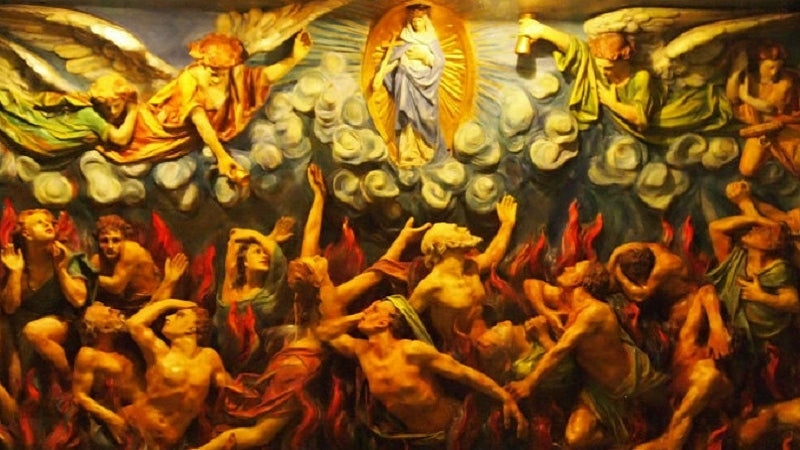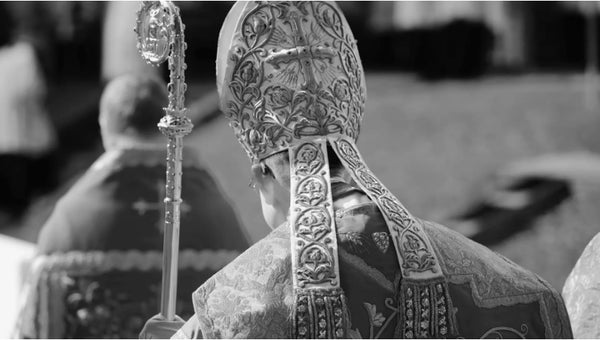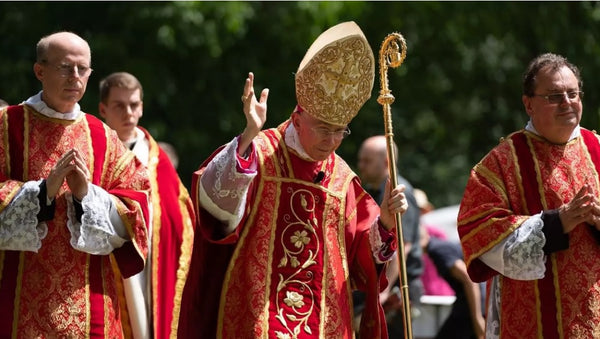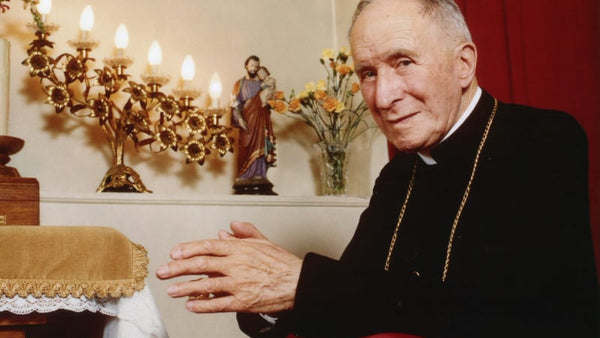During This Month of November, Let Us Pray for the Poor Souls in Purgatory

The month of November is traditionally dedicated in the Catholic Church to honoring the dead and relieving the sufferings of the souls in purgatory.
On this occasion the Church not only multiplies the number of Masses on November 2, All Souls Day, but also encourages the faithful to honor their graves and to have Masses said for their deceased ones throughout this month. Indulgences are attached to this pious works.
For several decades now, especially in Western countries, the practice of cremating bodies has spread. This custom is opposed to Tradition and prohibited by Church law, to the point where ordinarily it is sufficient reason to refuse to celebrate the funerals of those who voluntarily have themselves cremated.
The readers will find in our “Documents” two articles that appeared in Switzerland: one was published twenty years ago by Father Philippe Nansenet and the other almost one hundred years ago. They remain quite relevant to this burning issue.
An article by Cardinal Pie, the holy bishop of Poitiers, explains for its part the very consoling doctrine of indulgences. Although distorted by Luther and caricatured by Protestants and free-thinkers, indulgenced works are, on the contrary, a powerful means of sanctifying souls. They can be gained for the faithful departed and are a manifestation of the communion of saints.
Saint Augustine: Duties Toward the Dead
The care taken in planning a funeral, the respectful conditions of the burial, the solemn funeral ceremonies, although they are above all a consolation for the living, are a homage justly paid to the bodies of the deceased, especially those of the just and of the faithful, which were like the instruments and the vessels which the soul made use of in a holy way for all sorts of good works.
If the clothing and the ring of a father, if any other souvenir of this sort remains all the more dear to his children, since their love for their parents is greater, by no means should we treat disrespectfully the body itself, which we wear more intimately and closely united to ourselves than any article of clothing. Indeed, our bodies are not mere ornaments or instruments placed externally at our disposal, but rather belong to the very nature of a human being.
Besides the funeral ceremonies, the respect with which we surround the bodies and the dignified burial that is given to them, the most important thing is still the love, the memories and the prayers, the suffrages that aid the souls of the faithful departed after their life: even if because of some necessity it is not possible to find a way either of interring their bodies or of burying them in a holy place, we still must not fail to offer supplications for the souls of the dead. This is what the Church has undertaken to do on behalf of all deceased Christians in the communion of Christian society, even without mentioning their names, through a general commemoration, so that those who lack the prayers of parents, children, neighbors or friends might receive this help from this one pious Mother who is common to all the faithful.
We should also be convinced that, in those funeral ceremonies, we cannot bring any relief to the dead persons in whom we are interested unless we offer for them to the Lord the sacrifice of the altar, or the sacrifice of prayer or almsgiving. It is true that these supplications are not useful to everyone for whom they are made, but only for those who, during their life, merited the application of them to themselves. But it is better to offer superfluous suffrages for the deceased whom they can neither harm nor benefit, than to leave in distress those for whom they are useful.
Let everyone however hasten to render fervently this tribute of prayers for his parents and friends, so that his dear ones might do the same for him. As for what we do for the body that must be interred, it offers no aid for the salvation of the deceased person, but is a human sign of respect or affection, in keeping with the idea that nobody hates his own flesh.
Therefore we must take as much care as possible of the wrapping of flesh left behind by one of our neighbors when the one who took care of it has departed from it. And if those who do not believe in the resurrection of the body act in this way, how much more should those who believe, so that the final respects are paid to this dead body—which however is destined to be revived and to remain eternally—in such a way that people should find in them, so to speak, a testimony of this faith.
Also in News from Tradition

Death of Bishop Bernard Tissier de Mallerais

Prayer Intention for Bishop Tissier de Mallerais
We ask for prayers for His Excellency Bishop Tissier de Mallerais.
On the morning of Saturday 28 September, after the Angelus, he fell on the stairs of the seminary in Ecône and lost consciousness. He is currently in hospital.

Archbishop Marcel Lefebvre on the Feast of Christ the King
The following sermon for the Feast of Christ the King was delivered by Archbishop Marcel Lefebvre, founder of the Society of Saint Pius X (SSPX), on October 29, 1989 in Dublin, Ireland.
Today we must pray to Our Lord Jesus Christ, we must pray to the Blessed Virgin Mary to remain true Catholics and to do everything possible to become saints. We must come to church frequently, pray in our church, receive the graces of the sacraments in order to become saints, to sanctify our souls and to go to heaven with all the members of our families and all those who kept the Catholic Faith here on earth and now enjoy the happiness of heaven.

Angelus Press
Author